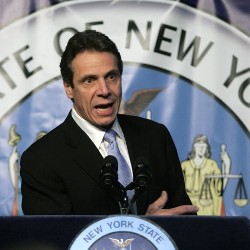The Progression of Recent New York DFS Lawsuits

While online poker talks in the Empire State were shuffled to the back burner this year, New York did manage to settle the matter of daily fantasy sports betting. During the summer, Albany lawmakers passed a daily fantasy sports (DFS) bill that Governor Andrew Cuomo (photo) subsequently signed into law, setting the stage for DFS to move forward as a legal, regulated form of online gambling. Now, however, the future of the controversial game is once again in question after a group of New York citizens filed a lawsuit against it at the beginning of October in the New York State Supreme Court.
In the meantime, the DFS industry’s two main operators, DraftKings and FanDuel, are apparently close to settling another lawsuit that was previously filed against them, this time concerning allegations of deceptive advertising and consumer fraud over claims as to how easy it is to win playing the game.
About the Legality Lawsuit
Reportedly filed by a group that opposes all forms of gambling, the lawsuit alleges that New York illegally passed its DFS betting law, and that the state’s lawmakers were not free to simply decide the matter. It argues, instead, that an amendment to the New York State constitution was required.
Specifically, the lawsuit points out a specific section of the New York constitution that the plaintiffs claim prevents the law from being passed. Found in Section 9 of article 1, it states that no lottery, pool-selling, bookmaking or any other type of gambling apart from betting on horse races and casino gambling at designated facilities is legal in New York.
The plaintiffs say that since New York did not amend the constitution, the law is invalid and cannot be upheld. The lawyers for the plaintiffs said in a statement that the group is acting out of concern for consumers, believing daily fantasy sports sites to be exploiting people. As Attorney Neil Murray from the law firm O’Connell and Aronowitz explains:
“The plaintiffs seek to protect the public from predatory gambling consistent with the Constitution. They also intend to stop FanDuel, DraftKings and other internet gambling operators from exploiting the financially desperate and the addicted in New York.”
Arguments Against the Lawsuit
The argument against the lawsuit is one that FanDuels and DraftKings have been making about daily fantasy sports betting since controversy first arose concerning their websites. Simply put, the case against the lawsuit will argue that DFS betting is not gambling and therefore can be legalized and regulated without any amendment to the constitution.
It was on this very basis that the law was passed in the first place. During debates over the legislation, several Albany lawmakers questioned the legality due to the wording of the constitution, but the bill’s authors countered that since DFS is a game of skill, they could define it as something other than gambling. Responding to its detractors, a spokesperson acting for FanDuel and DraftKings subsequently commented:
“The Attorney General, who certainly has had some strong opinions about fantasy sports, has clearly stated he will enforce and defend this new law. This is a layup – they have no case.”
Potential Impact
Since the question about whether or not New York’s DFS betting law comes down to the biggest question about the industry itself, the skill versus gambling argument, this court case is of major importance. If the New York State Supreme Court rules against the plaintiff, FanDuel and DraftKings will be able to tout the fact that one of the highest courts of law declared their sites not to be gambling sites. Should the court side with the plaintiffs, however, it could set a precedent that would open the doors for similar lawsuits in other states.
False Advertising Lawsuit
Another lawsuit which could also have a wider impact on the whole DFS industry concerns claims that DraftKings and FanDuel were involved in false advertising concerning the ease at which it was possible to win playing the game. After New York Attorney General Eric Schneiderman approved DFS legislation earlier this year, he still allowed the false advertising claim to stand, and according to sources that lawsuit may now be close to being settled for in excess of $10 million.
Once again, if the lawsuit is settled against these operators, then it could pave the way for other state Attorney Generals around the country to file similar claims. Although different states are likely to have widely different laws concerning fraud and truthful advertising, one thing the present situation does make clear is that the legal position of the USA’s DFS industry continues to be far from settled.










